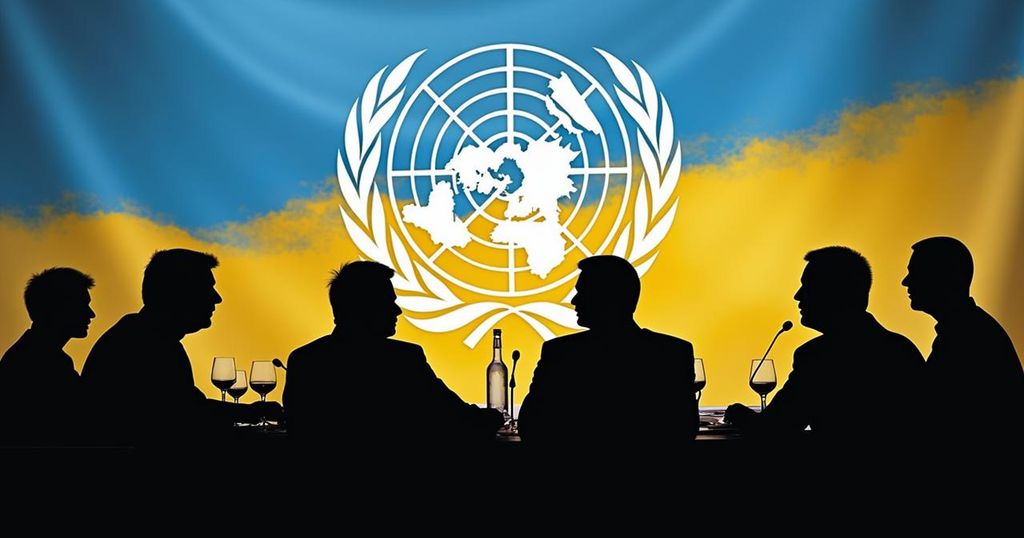China and Brazil Advance Peace Initiative Amidst Ongoing Ukraine Conflict
China and Brazil are promoting a peace initiative regarding the Ukraine conflict during the UN General Assembly, despite opposition from Ukrainian President Zelenskyy. U.S. Secretary of State Antony Blinken has expressed concerns about China’s support for Russia, while tensions continue with North Korea regarding arms trades. Amid these developments, Trump has met with Zelenskyy in New York, presenting a potentially pivotal moment for U.S.-Ukraine relations.
On Friday, China and Brazil continued their diplomatic initiative to garner support from developing nations for a peace plan aimed at resolving the ongoing conflict in Ukraine. This meeting, conducted amid the United Nations General Assembly, was attended by representatives from seventeen countries and led by China’s Foreign Minister Wang Yi and Brazilian Foreign Policy Advisor Celso Amorim. Minister Wang highlighted the group’s discussions, which focused on mitigating the escalation of the conflict, preventing the deployment of weapons of mass destruction, and protecting nuclear facilities from military engagements. Conversely, Ukrainian President Volodymyr Zelenskyy criticized the peace proposal, suggesting that it seemed to advantage the interests of Moscow. He remarked that proposals described as alternatives or half-hearted solutions merely provide Russia with the political leeway it requires to sustain its military operations. U.S. Secretary of State Antony Blinken also expressed concerns regarding China’s role in supporting Russia amidst the conflict, stating that China’s actions were contradictory to its stated desire for a resolution. Furthermore, South Korea’s Foreign Minister claimed that ongoing arms exchanges between Russia and North Korea posed significant legal and moral implications, reiterating claims from the United States and independent analysts regarding North Koreans supplying arms to Russia. Moreover, the misuse of Russia’s veto power within the UN Security Council impeded efforts toward achieving a peaceful resolution, as articulated by South Korea’s Minister during the Assembly. In a parallel development, former U.S. President Donald Trump met with President Zelenskyy in New York, seeking to strengthen relations amid rising tensions with Republican party members who question Ukraine’s future military assistance. Trump expressed optimism about resolving the conflict should he be re-elected, remarking, “We have a very good relationship, and I also have a very good relationship, as you know, with President Putin.” In military developments, Finland announced the establishment of a NATO base in close proximity to the Russian border, marking a significant shift in its military policies post the 2022 invasion of Ukraine. Reports have emerged of territorial shifts in the Donetsk region, where Russia claims to have captured Marynivka, despite Ukrainian reports of resisting Russian advances. Russia’s security service is currently investigating several foreign journalists in connection with reports from the occupied regions, underscoring the ongoing issues concerning media freedom in conflict zones. Further affecting the humanitarian landscape, nine Ukrainian children who were deported to Russia have been returned home with the assistance of Qatar. This case illustrates the broader implications of the war on civilian lives and the challenges faced in ensuring their welfare. Lastly, a missile strike on Kryvyi Rih resulted in multiple casualties, adding to the ongoing toll of the conflict.
The article addresses the complex geopolitical dynamics surrounding the war in Ukraine, with a specific focus on international efforts to mediate peace. China and Brazil’s initiative brings together developing nations, raising questions about the efficacy of alternative peace proposals against Ukraine’s established conditions for resolution. The engagement with the United States, particularly through Secretary Blinken’s comments, highlights Western apprehensions about China’s alignment with Russian interests. The issue of military support, arms trafficking between Russia and North Korea, and ongoing journalistic investigations underscore the broader implications of continuing hostilities and their effects on both international relations and local populations.
In conclusion, the diplomatic efforts led by China and Brazil, alongside significant statements from U.S. officials and the intersection with former President Trump’s meeting with President Zelenskyy, illustrate the layered complexity of international relationships influenced by the Ukrainian conflict. The situation remains precarious, with continued military activities and significant humanitarian concerns demanding sustained international attention and response.
Original Source: www.theguardian.com




Post Comment